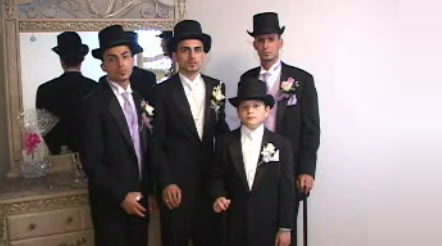
|
| Assyrian
Chaldean Wedding Customs and Traditions As a tradition, the bride is not invited to the little gathering, reason being is for the bride to rest well and is not allowed to see the groom until the next day. The party Starts by playing some Assyrian Chaldean music till the time of the shower, the groom is taken by his best man to the bathroom to get the last shower before his wedding however, as another tradition, a little boy, normally the ring boy, must be showered before the groom. After the young boy and the groom have showered, the music, dance, drinks and food serving continues until the late hours. The wedding day (often Saturday) starts by both the Groom's family preparing to go over to the bride's house and take her to church. As the Groom's family is preparing, the photographer captures pictures of the groom and his ushers as they are getting ready. The photographer also video tapes and takes pictures as the groom gives away little corsages to his family members, cousins and close friends, when that is done, they all dance in celebration of the special day. The groom and his ushers go to church and wait for the arrival of the Bride, his family, cousins, and close friends go to the Bride's house to take her to church. Similarly to what happened in Groom's house happens in Bride's house as soon as the Groom's family arrives. Early in the day, the Bride and her maids start their day by fixing their hair, putting their make up and wearing their dresses, the Photographer arrives and captures pictures of the bride and her maids in their beautiful dresses. The Groom's family arrives at the bride's house.
The bride gives away little corsages to her family and takes pictures
with everyone to cherish those memories. When time comes to leave
to church, the Groom's family start singing and as they are taking
the bride, normally, one member of bride's family will stand by
the door and not let the bride leave unless someone from the Groom's
family pays the amount they asked for, as soon as the amount requested
is given, than the bride is let out and off to church they all go.
In church, the bride's father or brother or uncle normally walks
her down the isle and gives her away to the groom. As the wedding
ceremony is done, bride and groom with ushers and maids of honor
all go to a park to take more pictures that they would look back
at and remember the wonderful day they tight the knot. As the guests arrive, appetizers are served. As soon as the groom and bride arrive in the hall, most of the guests and family members prepare for the grand entrance of the bride and groom by waiting at the doors with their Yalekhta. Assyrian Chaldean Syrian weddings have many unique symbols and one of them is Yalekhta, which is a piece of thin, see through, square shaped fabric decorated by many little different beads that make it look very unique and fancy; the more of these yalekhta we have, the nicer the wedding looks. We also have a cane, which is covered by white fabric and decorated by white pearls normally used by the person leading the Assyrian Chaldean dance. The grand entrance starts by having the last pair of usher and maid of honor enter the hall first, with a lot of music and people cheering, the rest of the couples enter one couple at a time and finally the bride and groom enter and everyone starts cheering louder and dance until they reach their table. As the groom, bride and the rest of the group settle, everyone else starts dancing to the Assyrian Chaldean Syrian music, which is normally the regular Assyrian Chaldean dance. The dance is a long line of people holding each other?s hands and simply dancing around, usually one person leading everyone else. Soft music is played throughout dinner. After dinner everyone is welcomed by a member of the bride's family and a member of the Groom's family on the families? behalf. Toasts are made and the wedding proceeds with more dancing and drinking until late night hours. At the end of the wedding, instead of presenting gifts to the groom and bride, it is a tradition to pay money, because it is understood to be more useful than gifts, they can purchase what they desire with that money. Paying the money is called subkhta.
|
